|
The Hellenic Genocide
Quotes from historical documents and related Photos. |
|||
CHAPTER XXVIII: "Let us briefly review the situation which enabled the Turks in the year of our Lord, 1922, to complete the extinction of Christianity in the Near East: The Germans were, as long as they lasted, the active allies of the Turks, and during this period nearly a million Armenians and many thousands of Greeks perished; after the Armistice and during the period which led up to the destruction of Smyrna and the accompanying massacre, the French and Italians were allies of the Turk, and furnished him moral and material support; the British gave no aid to the Greeks, but contented themselves with publishing an account of the dreadful events that had been taking place in the Ottoman Empire; the Americans gained the reputation of being pro-Turk, true friends, who would ultimately, on account of this friendship, be given the permission to put through great schemes, which would result in the development of the Ottoman Empire and, incidentally, fill certain American pocketbooks. The Turks confidently believed that commercial avarice would prevent us from interfering with their savagery, or even strongly condemning it. Never in the world had the Turk so good an opportunity to glut his lust for Christian blood without fear of interference or criticism." CHAPTER XXVIII: "And in all this tangle of conflicting interests, during which the Turk continued massacring, the thoughtful observer is impressed with one thing— the clearness of John Bull’s vision and the directness and tenacity of his purpose; he knew what he wanted and he took it. There are copious oil wells at Maidan i Naftun, from which the oil is piped down to Mukamra, not far from Basra, on the Persian Gulf, where the British landed early in the war. There are rich oil fields at Mousul. General Townsend was on his way there when the Turks stopped him at Kut el Mara, but that did not stop Cousin John. He is at Mousul now and the Turks would have liked to give Mousul to Admiral Chester and the others. No wonder the State Department says that it kept out of that." CHAPTER XXIX: "At the close of the Great War the Turk was beaten to his feet and his prestige ruined. "The Sword of Islam" had been broken. The victory over the Greeks, though with the aid of European officers and material, and the spectacular destruction of Smyrna with the massacre of its inhabitants, revived the legend of the conquering and avenging Turk. "The Sword of Islam" had been welded again, to conquer and destroy." CHAPTER XXIX: "The dissension in the Western World that made it possible for the Turks to make a clean sweep of Christian civilization in the Ottoman Empire, to burn Smyrna and massacre its inhabitants in sight of a powerful fleet of European and American war vessels, has added unknown weight to the "White Man’s Burden."" CHAPTER XXXI: ""In January, 1916, the Greek deportations from the Black Sea began. These Greeks came through the city of Marsovan by thousands, walking for the most part the three days’ journey through the snow and mud and slush of the winter weather. Thousands fell by the wayside from exhaustion and others came into the city of Marsovan in groups of fifty, one hundred and five hundred, always under escort of Turkish gendarmes. Next morning these poor refugees were started on the road and destruction by this treatment was even more radical than a straight massacre such as the Armenians suffered before."" CHAPTER XXXI: "The general subject of the extermination of the Armenians and Greeks, and the massacre of a million of the former, the real reason of the closing of most of the schools, is obscured by reference to the "Exchange of populations approved by the Lausanne Conference." The teachers of Anatolia College are "scattered." This is doubtless a correct expression to apply to people, many of whom have suffered martyrdom and are in Heaven, along with many of the teachers of other colleges." CHAPTER XXXI: ""From 1915 to 1918 came that series of atrocities such as the world of our day had hardly the emotions and conscience to comprehend, even amid the horror of the other cruelties of those other years. Those of us who were in the land at that time, who saw these things with our own eyes, have never told half of the truth of those dark hours. The Allied nations swore by all that was sacred, by the crosses of their fallen dead, that these things should not again be possible. One million five hundred thousand is a conservative estimate of the lives struck down in lust and torture. America sent in workers and dollars to the relief of the starving and tattered fragments of the people who survived the blast."" CHAPTER XXXI: ""The man most responsible for all this horror was Talaat Bey. What is the attitude of the government of Mustapha Khemal to Talaat and his methods? When Talaat died the government at Angora held a service in his honor. The Yeni gun, the official organ of the Nationalist party, came out with great mourning bands of black. In the editorial were these sentences: ‘Talaat wrote the most glorious pages in Turkish history. Let the eyes that do not weep become blind. Let the heart that does not ache cease to beat.’ Khemal has followed in the footsteps of Talaat. Massacres, deportations, cruelty, outrage and terror, have marked the reign of the Nationalist government. The Smyrna tragedy has taken place in hundreds of villages on a smaller scale. The innocence of childhood, the sacredness of womanhood, the tears of mothers, the cries of the helpless, make no appeal at all to the armies or the courts of this government."" The Hellenic Genocide Quotes from historical documents and related Photos. Previous page | Initial page | Site Map | Next page (28th of 29) |
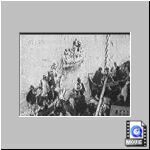
People escaping from Smyrna. The fire.
(1,5 Mbytes)
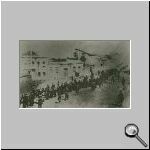
Deportation of Christians.
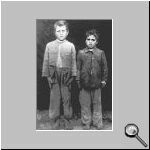
Orphans.
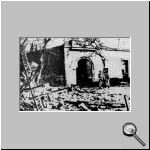
The French Hospital in Smyrna. Burnt.
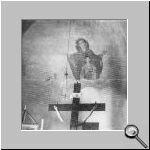
A vandalized Hellenic church.
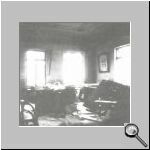
Church of Saints Constantine and Helene.
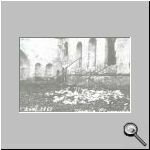
Destruction of the Church of Virgin Mary.
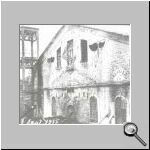
Destruction of the Church of Virgin Mary.
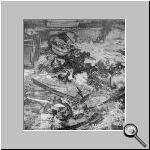
The Holy Chapel of the Monastary of Zoodochos.
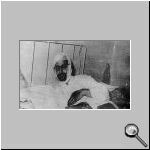
An Hellenic priest, after his battery and injury in 1955.